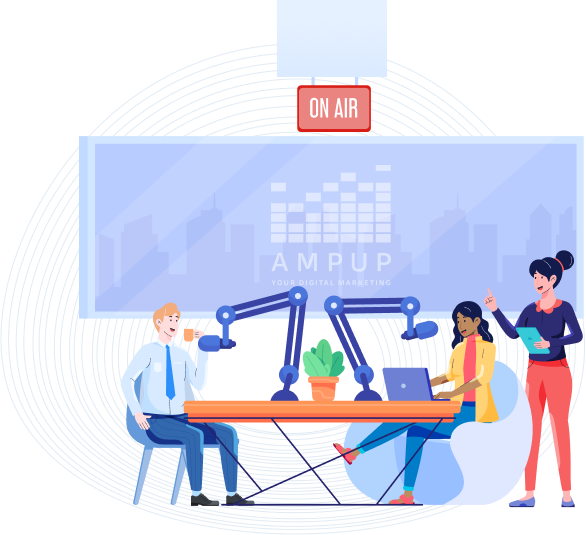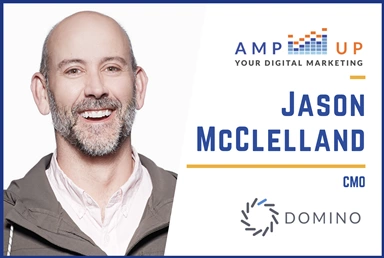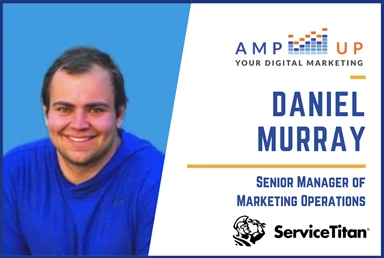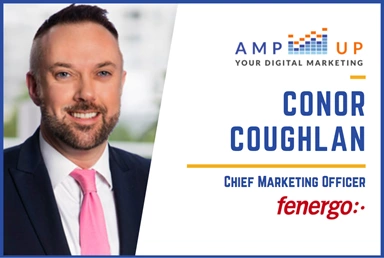Podcast
The ‘AMP Up Your Digital Marketing’ Podcast Presents:
Building the Case for Employee Advocacy Survey Results

Social media has changed the way we communicate, not only with friends and family, but in our business relationships as well. With our hectic day-to-day, we can now perform a quick scroll and catch up on the lives of those around us, all before crawling out of bed or uttering a word. And of course, this has its own positives and negatives - it alters the way people interact with others, with media, and with brands.
The days of billboard advertising being the go-to medium are long gone. Given how we interact with media has changed so drastically, it’s only natural the media around us changes, too. Enter the concept of employee advocacy. Much like influencer marketing, employee advocacy enables businesses to use the power of people, and their influential capacity, to expose others to news, information, and brand messaging as it relates to their company or purpose. And, it’s taking businesses by storm and delivering fascinating results.
In this episode of AMP UP Your Digital Marketing we meet Andrew Hutchinson, Content and Social Media Manager at Social Media Today, to discuss the findings on a GaggleAMP commissioned employee advocacy report. In this discussion, we’ll cover why there has been such a rising interest in employee advocacy and what the data in the report told us about marketers' perceptions.
You can download Building the Case for an Employee Advocacy Program discussed in this episode at any time.
Transcript:
Glenn: Welcome back to the show. Today we're speaking with Andrew Hutchinson. Andrew, welcome to the show.
Andrew: Thank you very much for having me, Glenn.
Glenn: Andrew, can you tell us a little bit about who you are and what you do?
Andrew: I am the Head of Content and Social Media at Social Media Today. So, basically, all the content that goes through Social Media Today comes through me. The majority of them are written by me. The majority of posts are written by us each day. And yeah, I manage all that content and keep us going.
Glenn: And so, I'm really excited to have you on the show today because we're going to drill into some research that you all did, it was sponsored by GaggleAMP but it was 100% done by Social Media Today. And I thought you really tapped into some really interesting findings which I hope we can go into. But can you kind of tee it up for us and tell us a little bit about the survey, how it was done and, you know, why we think it might have the validity that it has?
Andrew: Yeah. So, we conducted a survey on employee advocacy or the state of employee advocacy. We run regular surveys throughout the year on different aspects of social media and digital marketing. And what we do is, we basically send it out to our community and we try to get as many people as possible to respond. We send it out via email and via social networks. And, yes, see what people are actually experiencing.
So, it's one thing to theoretically write about what's happening in the industry and what's happening with the latest advertising trends or whatever, but it's another thing to get the actual feedback from the people who are on the frontline and they're actually doing it. So, we find that really valuable to actually get real-world experience. And it's really valuable for our readers in particular, because it's not theoretical, it's not just us saying, hey, this is a new ad thing from Facebook, this is actually what people are experiencing.
So, for this survey, we had over 400 respondents which gave us a reasonable field of the response. I think half of them were B2B, around half B2B, half B2C, 54% were B2B and 29%, sorry, were B2C. So, yeah, it gave us a good field of the response for what's happening in the actual industry and what people are actually seeing.
Glenn: And for those folks who may not be aware of Social Media Today's audience, can you kind of describe who that would be? So, what would the – beyond the kind of B2B, B2C, are the marketers, are they specifically digital marketers, are the social media, how do you break that down?
Andrew: Yeah, the majority would be digital marketers, obviously. Like, what we cover – our aim is to cover the latest in digital marketing news every day. So, our ambition is that you come to our site and you're going to find all the latest news updates you're going to need to know on social media marketing and digital marketing for that day. So, in that sense, yeah, all of our followers are digital marketers, they're the people who want to learn about digital marketing and want to understand how it works. But that means we are reaching a lot of different organizations and a lot of people who are involved in initiatives like this, particularly in terms of employee advocacy and pushing them out through social channels.
Glenn: And we're going to have a link to this report in the information of this podcast, so however you're consuming the podcast, you can look there or you can come to gaggleamp.com and just go to our podcast section and you can find this. But anything really come for you that surprised you whether that maybe you weren't expecting in the data?
Andrew: I mean, it wasn't so much a surprise, like, most of the stuff, you sort of knew. But I mean, the results show that people realize that employee advocacy can be valuable. I mean, people know that – you know in your personal use of social media that recommendations from friends are more valuable than getting the brand post, you might be, like, obviously, brands are going to promote their latest offer or they're going to try and say that they're greatest in the market or whatever, but getting a recommendation from a friend or a relative is going to carry a bit more weight.
So, we all know that intrinsically, it's something that you understand without having to sort of do any sort of survey. Having that information beforehand, of course, you would expect that more brands would be looking into advocacy. So, it was somewhat, I guess, sort of surprising that not as many brands have plans in place as you would expect. So, like, I think it was 29% of brands are planning to implement a program in the future and nearly 31% had an employee advocacy program in place. So, it shows that only a small percentage of 30%. So, 70% don't have one in place, with only a few planning to do one in the future. So, in that sense, given that we know that it's effective. I guess that's sort of surprising but it's also not that unexpected.
Glenn: Yeah. I think what really – what jumped out at me was actually the second thing in the report that talked about the maturity level. That one surprised me a little bit because it's – when you start talking about the program itself, it becomes readily apparent that even people who are running programs are still young in there – at least from the practitioner's point of view.
Andrew: Yeah, 17% of people would say, they're just starting out with their program and only a smaller percentage – well, planning to start but no program yet, was like 60% of respondents. So, the majority are planning to start but they don't have it in place yet. And a very much smaller percentage had a program in place for more than five years. I mean, that makes sense. Five years ago, you probably weren't thinking of this in the same way, but as you go through it, yeah, only a small percentage of three, a small percentage of one year.
And yeah, the majority, 60% as you say, is still implementing their strategy. So, yeah, in that sense it's still a long way off. Like, it feels like something that's only come up in recent years. As much as I, we already know that people influence decisions and that's general knowledge. It feels like brands are just starting to understand that maybe that's a better way to utilize social and to utilize their employees as advocates as opposed to trying to just advertise and push their message out.
Glenn: And for those people who are starting to head down the path, what did you find in terms of some of the opportunities or the ROI that they might expect?
Andrew: I mean, the brands that are implementing it, well, we didn't really look at the absolute benefits of what they're saying, we looked at the more effective strategies, more effective approaches, and what the most effective ways they're implementing out. So, company recognition, we found, was the most beneficial way to incentivize an employee advocacy program as opposed to monetary incentives. Or implementing a sharing scheme. So, those ones are the ones that we would recommend against.
If you're pushing it out to your employees and saying, you need to share these news updates on your social channels, that's not really an effective strategy. And we've seen that or you would have seen that as would everyone, when you go to social media and you see an update from someone which is clearly a generic brand messaging type post, those we don't think are effective. And when you look at the responses, it seems to suggest, that's probably not the case. And internal recognition is a much better way of incentivizing employee advocacy. So, that was probably a key thing is just working out for us, what the best way to do it is, like, what are they seeing results from?
And when you look at the content that people are producing, we found that thought leadership and videos were the most effective types of messaging in terms of employee advocacy. So, thought leadership, again, you're recognizing your internal experts. And that has, like, a really big value in terms of you're helping them build their own professional profile, not just within your company but by exposing them to the external, sort of, stakeholders, you're also helping them build a bigger reputation for them professionally.
So, I think that's the biggest thing that you want to get in your employee advocacy program is to get buying, you need to be sharing with your employees why it's of value to them as opposed to why it's a value to the brand. So, obviously, it's a value to the business to have them sharing on your behalf. But you also want to explain that the benefits for them are that we can help you build your professional profile and help you build status within the industry, which can help you in far more ways than just boosting brand messaging. So, thought leadership and videos, yeah, produce the best outcomes as well as, as I was saying, incentivizing by recognition. So, I guess in that sense, that's what we are looking at, is what are the more effective approaches that people are using?
Glenn: Well, one of the things that we see time and time again, which this is consistent with is, in order to have a successful program, you have to start with the right mindset. So, the folks who implement this have to be thinking along with that win-win scenario. So, it's got to be won not only for the company but also for the individual employee for them to participate. This doesn't necessarily mean buying them, buying their participation, but it's got to be some value-add to them. And the biggest value-add that they're going to get is their own personal brand is going to be enhanced by this.
Andrew: Yeah, that's exactly right. And trying to express that. Yeah, it's not just to benefit us as a business, it's to benefit you. And we want to showcase you and you're our internal experts, you are the people that we rely on for these types of things. So, we want to help share that information. We want to share your insights and make sure that you're getting the recognition that you deserve. And that's both internal and external. I think that's a far bigger motivating factor than, as you say, anything else like this.
We ask what the monetary incentives were relevant, and that was not a – didn't get a lot of response, like, people didn't think that was an effective way to incentivize employees by saying, well, you know, give you money if you get X amount of likes or something like that. Like, those types of things – like, I've seen different recommendations where the same, as I was saying before, people say compulsory share, make your employee share stuff, those things are not effective. And, yeah, really, it's about understanding what people are getting out of it, what not only you're getting out of it but also the person who's sharing is going to get out of it?
Glenn: And one of the areas you went on the survey, which I found fascinating was, you were asking about some of the personal social media behaviors of the folks who were taking the surveys. So, these are the marketers and you're asking them what do they personally do? Before we dive into the results of that, can you talk a little bit about why you decided on that kind of line of questioning?
Andrew: In terms of whether they respond better to different types, is that what you mean?
Glenn: Yeah.
Andrew: Yeah. I mean, so I guess that's what we – we wanted to highlight the value of employee advocacy. So, we asked them directly, like, what do you find the most effective? If you're looking for something, do you find posts recommendations from your friends more effective than brand advertising? And, yes, 73% of respondents said that's the case, like, they definitely find company updates shared by personal profiles are far more persuasive than those coming from the brands. So, I mean, as I said before, we sort of know that. We know that recommendations coming from friends are more relative, it's just then matching that up with what your brand approach is and making sure that you're considering not only from a broadcast perspective, like, traditional advertising of push messaging, but also, what do you actually engage, what's actually happening in your world and how can you apply that to your approach?
Glenn: And what I was fascinated about this is, the people that you might think would be the most engaged or at least have the skillset to be the most engaged on social, aren't.
Andrew: Yeah. I mean, like, it depends on how you look at it, I guess, but, yeah, I guess that's where we're getting to. We're trying to work out how it actually works and what actually makes these things happen, what are the actual behaviors that people are undertaking on social media that you need to take into account when you're planning out an approach?
And again, a lot of marketers look at these things from a traditional advertising perspective and they come to social platforms and try to push their messaging as they always have been in other mediums. And it's just trying to rethink that and make sure that you consider that it's social media, like, that social term is actually really important. Interaction and engagement are important. And understanding how people actually use the platforms is how you should be angling your messaging.
Glenn: Well, what I thought was really powerful about this is sometimes there's an expectation that people are just going to do this on their own. And if the people who have the toolsets and the understanding about how to do this, aren't doing it, why would there be an expectation that the rest of the employee base would be doing it on their own? So, that's really what I thought was fascinating about the results of this. Did you want to walk through some of this, you know, from a marketer’s perspective, what do they typically do from a personal point-of-view?
Andrew: Well, I guess, why try to get down to the concerns as to why people – what holds people up from sharing brand updates? And I guess the main issue is not wanting to spend their personal connections. But there were also quite a few respondents that said they weren't confident that they understood the industry or they weren't confident with what they were allowed to share on behalf of the company, are they going to get in trouble if they shared something that's not the right messaging.
So, I guess that's the other part of it is, as you say, if you're relying on people to just do it off their own bat, then a lot of them aren't going to because of those limitations, because of those things they're not sure about. So, you really do need an employee advocacy program in order to educate people in that respect, to make sure that they're aware of what they're allowed to share and how they can share in a beneficial way and making sure they're adding their own personal perspective on their shares as opposed to just sharing the straight bare messaging which comes back to that spam concern and sharing broadcasted messages and just pushing them out to their friends. Like, obviously, no one wants to be that guy who's just spamming out their generic company updates.
So, it comes down to initiating an actual plan, an actual training plan as to explain, as we say not only the value to the individual but also what they can share, how they can share and trying to really push that engagement, make them want to be involved in the program as opposed to feeling like they're not sure about it.
So, you're exactly right. If you want people to just do it on their own then that's probably not going to happen, you really do need an established program to make sure that you have all these checks and balances in place, so people are aware of what they can and can't do on social media on behalf of brands.
Glenn: And just some advice for our listeners out there. You know, one of the things that you may want to look at is your social media policy, if you have one. A lot of social media policies were written during a time where they're trying to say what not to do and very few of them actually give them examples of positive things that employees can do, so I think it speaks to what you are saying with regard to just training and helping people understand and helping people pass the fear and the uncertainty that's often associated when it comes to communicating on behalf of the company.
Andrew: Yeah. That's right. I mean – and it is, like, as we said in the results, like, not many programs are more than five years old and that makes perfect sense. Like, it's only become a bigger push in more recent times as brands have come to understand what social media is. So, shifting from that traditional ad mindset to understanding the social elements and how you can use them to your advantage. So, yeah, it makes sense that there have been restrictive policies where we don't want to be hit by a PR crisis of some kind, so they've put measures in place that stop people or are designed to stop people from sharing the wrong thing.
But, now it's like looking at, alright, what are the right things, what can we do that would actually incentivize people to want to share on behalf of the brand. And that takes a different approach and a different thought process. And, yeah, a dedicated training schedule to be able to make sure that people understand exactly, again, what the benefits are and how to go about it and how they're doing something that's of benefit to them and to the people they're sharing with as opposed to just being representatives of the brands and pushing out ads.
Glenn: Andrew, I really appreciate having you on and talking through this with you. Again, we're going to make this available for folks if you just want to check the notes within the podcast or the blog post associated with this. But, any final thoughts on any of the research or the results?
Andrew: I mean, the biggest thing is, yeah, as you say, at the end, when we ask people, what do you find the most effective share, what impacts you the most when you're all looking at in the consideration phase? And it's a post from friends. Obviously, that's what happens. Like, we see posts from friends and people we trust and that's going to give us more push to go and do something. So, recognizing that and understanding, again, the social elements of social media and how people interact with that content, really builds the case for an employee advocacy program.
And I think there's a huge value in showcasing your best employees. Like, those people who are experts in your company, who just – no one knows about them, though, if they're just sitting in your office, you won't know about that guy who knows this and that, and that guy who knows this part of the business. But celebrating them as external experts can give them a huge career boost, can give them a huge professional boost.
And I guess the risk in that respect is that you don't want to lose people, you don't want to be building them up so much that it's like, whoa! that, you know, they can go off and leave your company and they have such value. But that's also how it should be, right? You should be building people up so they do have significant value and you should be incentivizing them to stay within your company by building a better company culture.
So, ideally, your company culture is so great that they'll want to stick with your company even if they could go somewhere else. I think that's one of the quotes from Richard Branson, isn't it, that you want to build a company that people want to stick around and even if they could go anywhere else. I think that makes a lot of sense.
Glenn: I think that makes perfect sense, because if your biggest worry about not doing a program or not building up your own employees is that your employees are going to leave, then you probably have a cultural problem that's not going to be solved by just an employee advocacy program.
Andrew: Yeah, that's exactly right. So, I think that sort of fear or that sort of concern has traditionally existed within corporate environments and the sort of headhunting culture and things like that. And, you know, I think brands need to move past that and consider what the actual benefits are and really try and pitch that to the people who are going to be involved, a pitch that to the employees in saying that this is going to be of benefit to you, we're going to help you build your professional profile, here's how you can do it, here's how you can become the guy in the industry as opposed to the guy in the company. And that can have value beyond your wage incentives or salary incentives. That can be like, we're building your profile, building your personal brand, and giving you a new platform to be able to share your expertise that we all know you have but you've not been able to express.
Glenn: Absolutely. Andrew, if people want to get in touch with you, what's the best way?
Andrew: Well, I mean, Social Media Today, if you want to read any of our stuff, like, all the stuff that's going up there every day. But I'm on Twitter, I'm active on Twitter and my Twitter handle is @adhutchinson. But, yeah, generally all the stuff, if you go through Social Media Today or send us an email via the website then we can get back to you.
Glenn: Fantastic. Andrew, thanks so much for being on the show.
Andrew: Thank you for having me.
Andrew’s Bio: Andrew Hutchinson is the Content and Social Media Manager at Social Media Today where he has authored thousands of posts. You can reach him on Twitter.
Want to appear on AMP Up Your Digital Marketing? Contact Us and let us know how our listeners can benefit from hearing your message.

Ramin Edmond
Ramin Edmond is the former Content Strategist for GaggleAMP.









